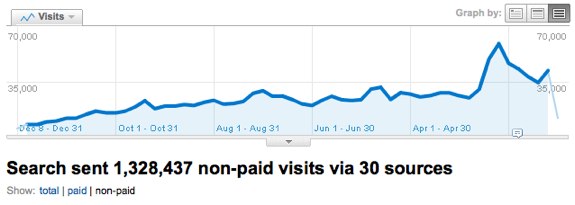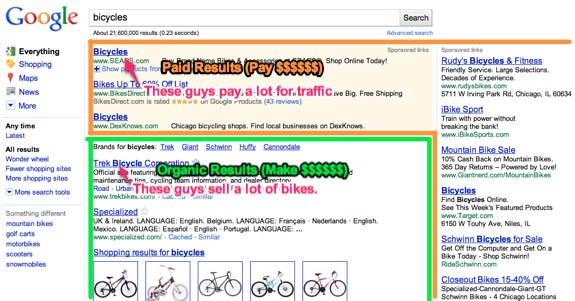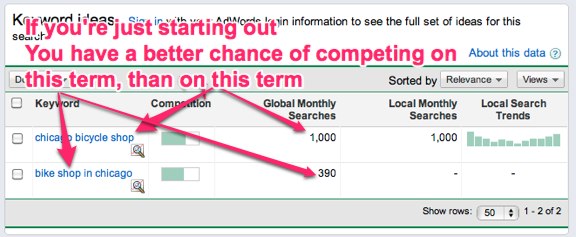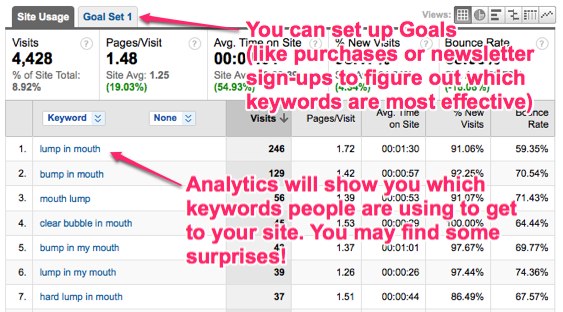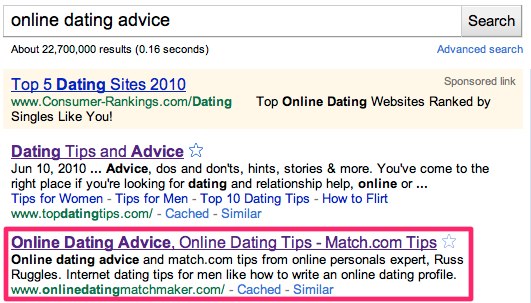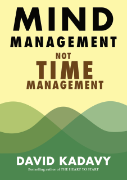Subscribe to blog updates via email »
Everything You Already Know About SEO
The basics of SEO are stupidly simple; and it seems like everyone knows – or at least pretends to know – those basics. Still I get asked about SEO pretty often. I don’t consider myself an expert, but I’ll share what I know, and hopefully it will help some people.
I’ll be talking Google-centrically because Google will likely account for the vast majority of your inbound search traffic. Additionally, if you rank highly on Google, you will probably do pretty well on other search engines anyway.

WANT TO WRITE A BOOK?
Download your FREE copy of How to Write a Book »
(for a limited time)
I’ve been writing with SEO in mind – and using best practices as best as I can – on kadavy.net for over 6 years now, and my search traffic has steadily increased.
Why SEO is Important
SEO is the “location, location, location” of doing business on the web. If you have a bicycle shop on a busy street, you’re going to sell some bikes. It doesn’t matter how high your prices are, or how rude your employees are – you are going to sell some bikes. Likewise, if you rank highly on Google for “bicycles,” you are going to sell a lot of bikes, because a lot of people search for “bicycles.” That is your foot traffic.
I don’t want to make the mistake of assuming that everyone knows just what it means to rank highly on a keyphrase. If you are selling a product or service, ranking highly on keyphrases related to that product or service is essentially free money. If you rank first on Google for “bicycles,” (which is darn near impossible, by the way) you will get a huge number of visitors on your site looking for bicycles, and it will cost you nothing. This is called “organic” traffic, and it’s what SEO builds for you.
But, some businesses pay big bucks for such traffic by buying Google’s AdWords. In doing so, their site shows up next to Google’s organic search results, and they pay whenever someone clicks through to their site. For “bicycles,” those businesses pay an average of 71 cents per click. For “cambria bicycle” they pay an average of $12.55.
Paying for traffic like this can be profitable if the campaigns – and conversion within your site – are managed carefully; but obviously free traffic is ideal, and translates to big sales. This is why SEO is important.
Choosing the right keywords
Before you make sure you’re using SEO best practices, it’s helpful to have some idea what keywords, or keyphrases, you would like to rank highly on. But, just because you pick a descriptive keyphrase, doesn’t mean people will find you. It has to be a keyphrase they are actually searching for. I kick ass on “lump in mouth” because that’s what people search for when they have a mucocele. Most people don’t search for “mucocele” because they don’t even know what one is – until they get a lump in their mouth – and search for it.
Ideally, each page on your site should compete well on a couple of keyphrases that are descriptive of the content on your site, have reasonable search volume, and on which you stand some chance of competing.
You can find out the volume of keyphrases by using the Google Keyword Tool. If you’re just starting a site where you sell bicycles, it would be nice to compete well on the keyword “bicycles,” which has a monthly search volume of over 7 million searches per month – but you don’t stand a chance as a new site. If your site is for a bicycle shop in Chicago, then you’d probably have better luck competing on “bike shop in chicago,” which has a measly 390 searches. Once you dominate that keyphrase, then you can start trying to compete on “chicago bicycle shop,” which has 1,300 searches.
A good place to start to find keyword opportunities from your site is your existing data. If you don’t already have a stats package set up on your site, you should. Google Analytics is great and it’s free. If you happen to already have Google Analytics installed, you can find the keywords that visitors are using to get to your site under Traffic Sources > Keywords. Here you can see what keywords are bringing in the most traffic, and if you’ve set up e-commerce or marketing (such as lead-generation) goals, you can see what keywords are actually converting into business. You are likely to find a few keywords you didn’t expect, that you happen to rank pretty highly upon. It’s a good idea to aim to build upon this success by targeting these keywords further, or targeting related keyphrases. Look for synonyms that you may not already be using (bump ~ lump, mouth ~ lip), and update your content accordingly.
Ranking highly for your target keywords/keyphrases
There are endless complex theories on just how a site ranks highly on search engines. Some of those theories have no basis at all. The truth is, nobody except little robots at Google knows just how a site ranks higher than another. What we do know is that 1) the content of a page, and how it is coded, and 2) the authority of other pages that link to a page – especially for the topic in question – are the most powerful dictators of how well a page ranks on search engines.
Content and coding
The content of a page – meaning the words within that page – have a huge impact on how well a page ranks for given keywords. If your target keywords don’t appear on your page, you will have a hard time ranking highly for that keyword. It’s not impossible, but I’ll get to that later. Relevant content has to be within your page – as code (meaning not as an image) – for search engines’ crawlers (the robots that read your pages) to read that content, and rank you for the appropriate keywords. This is a strong reason why Flash websites do poorly on search engines, and former print designers that just slice up a design on a WYSIWYG program make poorly-performing websites: the real content gets locked away, where crawlers can’t access it.
It’s also essential to use good coding practices in building your pages. There are standards for writing HTML content, and they help rank chunks of content within a page in order of importance. This helps search engines know the difference between the important – and less important – information on a page, and thus rank that page for various keywords.
Following is a run-down of important content-based factors that dictate how your pages rank on search engines.
URL
Before a search engines’ robot can read the HTML on your page, it will read the URL at which that page resides – and the content of this URL has pretty heavy influence on how that page ranks on search engines. So, if my bike shop is at http://bikeshopinchicago.com, it will rank very highly on “bike shop in chicago.” If I have a page for Cambria Bicycles, I may want to put it at http://bikeshopinchicago.com/cambria-bicycles. Note that you shouldn’t automatically pick your top keyphrase to be the domain that you purchase, as branding – and planning for the future expansion of your business – are both important; but you should have search engine (and human) friendly URLs that are in plain english instead of http://example.com/?p=34.
Title Tag
The Title Tag of a web page is the strongest piece of information indicating what a page is about. Many businesses make the mistake of naming this page “Home Page,” or ignoring it altogether (this is why there are so many pages on the web called “Welcome to Adobe GoLive…”). For any given page on your site, your Title Tag should contain the exact keyphrases that you want to rank highly on. If it is the home page – or if your business name contains your target keyphrases, you could then follow that with your site’s name. So, if you’re business is David’s Bike Shop, your title should be “Bike Shop in Chicago – David’s Bike Shop.”
Meta tags
The meta tags also contain some information that search engines give strong authority to when evaluating a page. There are several different meta tags, but the one that you should concern yourself with is the “description” meta tag. This is a very short (like around 200 characters) description of what the page contains, and search engines not only use its content to evaluate what a page is about, but also to display to users when your page is listed in search results.
Headers
Then we have the headers within your HTML document. These are ranked in order of importance: H1, H2, H3, H4, H5, and H6. There should only be one H1, and this should probably be used for the actual title of your page (which may or may not be the same as your title tag). Some people like to use the H1 for their logo and link to their home page – it depends upon how narrow of a focus your site is. So, if you have a long document, full of text, it’s a good idea to break it up a bit by inserting some useful headers that also happen to contain some of your target keywords.
Content – EM, STRONG, IMG
Finally, you have the actual content of your page, which is hopefully helpful, interesting, and – incidentally – contains your target keyphrases. In addition to your target keywords, your content will probably bring in visitors on a number of “long tail” keyphrases that just happen to show up naturally within your great content.
Within your content, you will hopefully have some images, since they are useful for users. Much like the URL of your page is important to search engines, the file name of your images is also important, and should be descriptive. So, if you have a JPEG of a mountain bike, your image should be called mountain-bike.jpg, or – even better – include the color and brand: mountain-bike-schwinn-blue.jpg. The “alt” attribute of your IMG tag should also be descriptive, so “blue schwinn mountain bike” would do. Don’t forget, you can end up with a large amount of traffic from Google Image Search, if you use descriptive alt attributes.
The italic and bold HTML tags (EM, and STRONG, respectively) also hold higher authority in an HTML document than your plain content (which sits inside of P tags). When you italicise or bold words within your content, it lets search engine crawlers know that those words are important and relevant to the point of the page in question, so it’s a good idea to do a little of this – provided it supports the experience for your human users.
Authority of linking pages
Ranking highly on Google is ultimately all about the authority of your page or site on the keywords in question. This concept of authority also applies generally to your site just being an authoritative site. Google uses a ranking called “PageRank” to measure how much authority a given page has, on a scale of 1-10. There is a complex algorithm behind PageRank that you shouldn’t concern yourself with, but Google does provide a Firefox plugin called Google Toolbar, which shows what the PageRank of a page supposedly is. 7 is considered a very high PageRank. NYT.com is a PR 9. Kadavy.net’s home page is a 4, which is considered to be decent for a personal blog.
There are a number of factors that go into determining a given page’s PageRank. While the actual algorithm is an ever-changing secret, here are a few factors that are widely accepted to be a part of the algorithm:
- Age of domain: how long has the domain been registered?
- Authority (or PageRank) of pages that link to the page from other domains.
- Date of expiration of domain: is the domain expiring soon, or has the owner registered it a couple years into the future? This is in one of Google’s patent filings.
Content of linking pages, and of anchor text of link
To put it very simply, when other pages on a given topic link to your page of a related topic, search engines generally will rank you higher on that topic. If the PageRank of the page linking to your page is particularly high, Google will rank you higher for that.
Also important is the actual “anchor text” – or the content between A tags – of the link that links to your page. So, a link that says “Bike Shop in Chicago” will do more to rank “David’s Bike Shop” higher for searches for “bike shop in chicago” than if the anchor text says “David’s Bike Shop.” I’d be remiss to not mention that people once did this on a mass scale before (known as a Google bomb) such that the top hit on Google for “miserable failure” was once the Wikipedia page for George W. Bush. Such a Google bomb was implemented by tons of people doing this: miserable failure.
The A tag also has a couple of attributes, such as the “title” attribute, which can have descriptive text applied to it. I haven’t seen anything to make me think that using this title attribute helps with SEO, but it certainly wouldn’t hurt. The rel attribute can have a value of “nofollow” which tells Google’s crawlers not to follow the link, and therefore to not give the page any extra authority based upon the link. Most blogs give all links in comments a rel=”nofollow” attribute to discourage SEO-minded spammers from exploiting the comment functionality.
Everything in moderation
So, if you took all of this knowledge literally, you might stuff all of your pages full of keywords to the point that they didn’t make any sense, and contact site owners all over the web, purchasing links, and stuff all of your pages full of links – full of your keywords – to other pages. You may even obscure these links by making them the same color as your background, or hiding them with CSS.
Using some of these tactics in extreme moderation may even help you a little bit, but anything more than that will be heavily frowned upon by Google. They supposedly take very sophisiticated measures to detect use of these tactics, and will downgrade a site for doing so – which is something you do not want to experience (think immediate loss of tons of business). There are tons of shady tactics for getting links. As a general rule of thumb: if it feels like its deceiving someone, Google probably has some way to detect it, and won’t like it.
Getting the content / getting the links
Having a site full of relevant keywords, and being linked to by sites with relevant keywords, is a means to an end, not an end itself. You achieve this by using good coding practices, generating content, and generating useful and compelling content that others want to link to.
Here are a few legit ways – that Google doesn’t frown upon – to get content and links to your site:
- Have a blog. To rank highly on keywords, it’s pretty much a must to have useful content, rich with your target keywords, that is updated on a regular basis. A blog is the best way to have these attributes. Unfortunately, Google still ranks some pretty shitty content really high, so I’d say that having some not-so-well-written content is better than having none at all; but hopefully this will change when they improve or someone gets around to building a better search engine.
- Directories. DMOZ is the highest authority directory, and is free – but it’s nearly impossible to get into. There are plenty of paid directories out there, but the only ones I know of that are definitely high-authority are Yahoo! Directory and Business.com. Be wary of other directories or consult a professional. Then, still be wary.
- Write guest posts on other sites. Find a high-authority site that your target audience reads, and pitch a guest post to the author. They’ll get great content, and you’ll get links, and exposure to their audience. Ramit wrote a fantastic article on writing and pitching guest posts.
- Write link bait. The best way to get lots of links is to write content that other people will link to, share, and talk about. A really thorough, information-rich how-to (like this post) is a good example, but writing posts that are very controversial works well, too (unfortunately). Such posts then get shared on social news sites such as Digg.com, and on Facebook and Twitter. Do lots of research and make some pretty graphs, and your chances of getting lots of links increases again.
- Find your audience. When you’ve written really great, useful, and interesting content, get as many people in your target audience to see it as you can. Submit to a social news site in a category where those people hang out, or buy traffic in your target category on Stumbleupon (5 cents per visit, with a chance of unlimited free traffic). Another good tactic is to find an already popular post on your target topic, find other sites that have linked to it, and pitch to the authors of those sites.
See?
You already knew all of this stuff about SEO, but applying this knowledge is all that you need to be well on your way to ranking highly and having money streaming into your business. There are probably some very reputable SEO firms out there who are great at applying this knowledge, and more; but be wary – because there is so much mystery behind SEO, the field is rife with consultants that overcharge and use tactics that will either only work in the short-term, or will get your site downgraded.
I’m sure there are tons of other great tips I didn’t cover – or maybe I’m just plain wrong about a thing or two. Talk about it in the comments!
Related around the web:
- Search Engine Ranking Factors – A survey of SEO professionals on what is important to search rankings.
- WordPress Optimization: How I Reduced Page Load Time by 75% – Google also recently started ranking based upon page load speed

